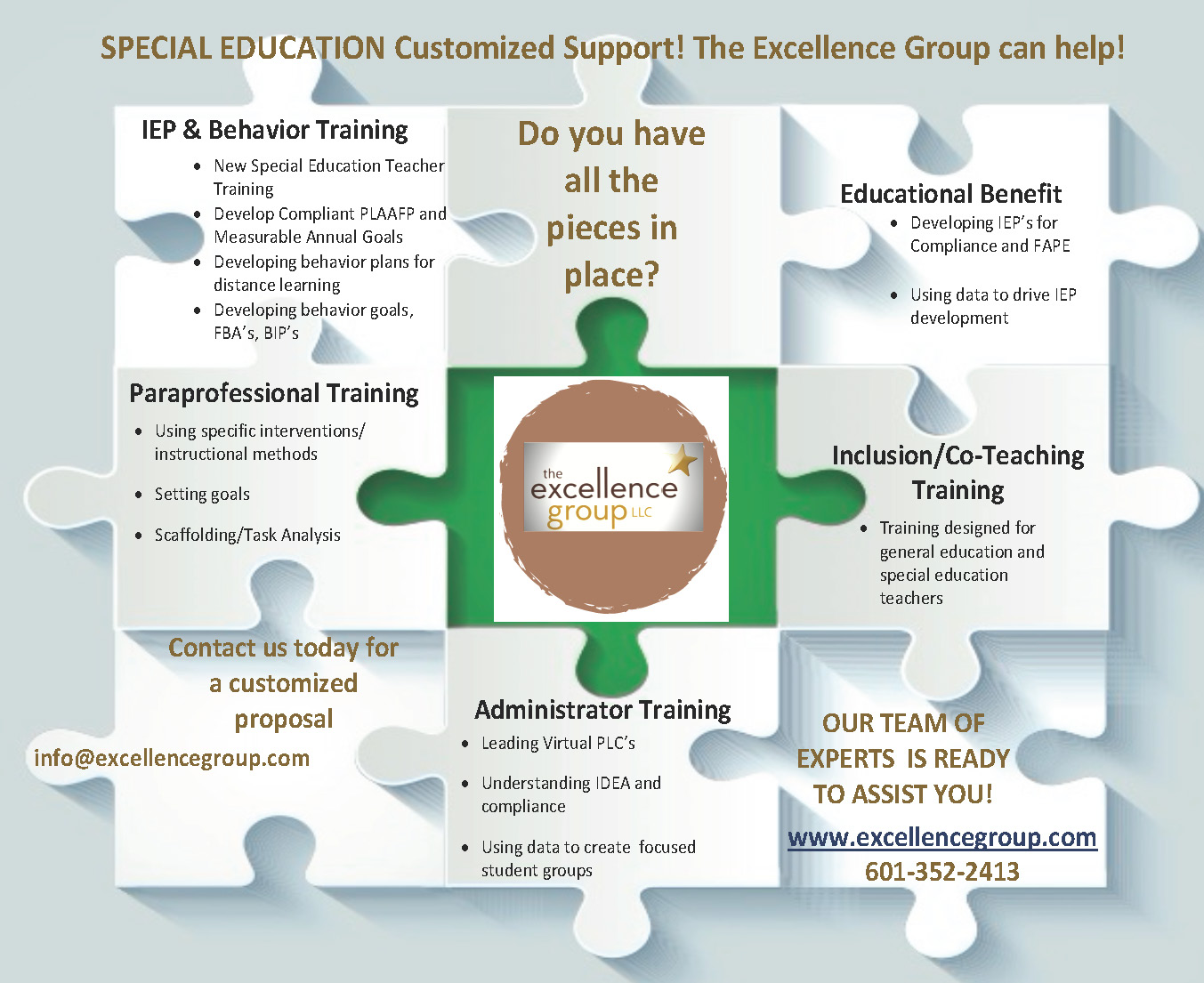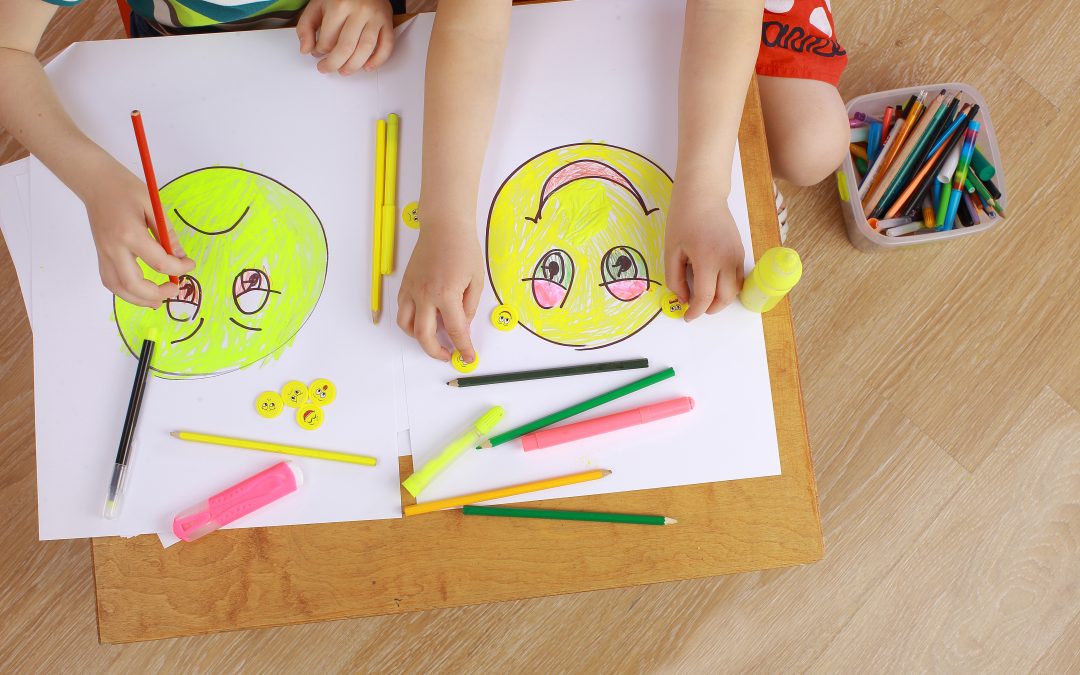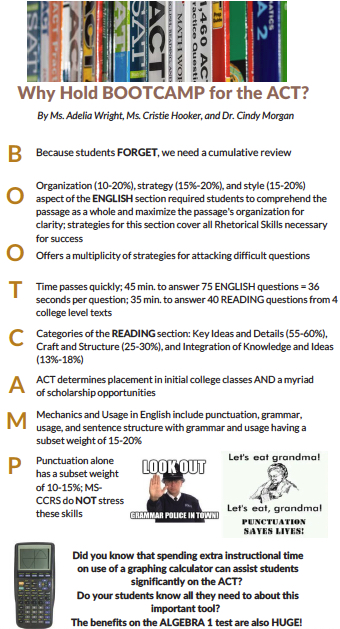by Leigh Mobley | Feb 11, 2025 | Announcement, Service Spotlight
All districts are facing challenges in regards to serving students with special needs! There are many pieces to the puzzle and we are here to help! Call us today for a customized plan to meet the needs of your district. We offer:

by Leigh Mobley | Jan 1, 2025 | Announcement
The Excellence Group offers a full range of services customized to meet the needs of your district.
FOR MORE INFORMATION CLICK ON THIS POST FOR A LINK TO DOWNLOAD OUR BROCHURE OR VIEW OUR INFORMATIONAL VIDEO!
CLICK HERE FOR EG BROCHURE
by Leigh Mobley | Jan 5, 2024 | Announcement
The Excellence Group is here to help! We can offer assistance in all academic areas and work hard to assist you in implementing the standards required by the MDE. Below are links to MDE resources that have been vetted and aligned to MS-CCRS. We can assist you in using these resources and many others!
MS-CCRS SCAFFOLDING DOCUMENTS: mdek12.org/ese/ccr
LEARNING AT HOME RESOURCES: mde12.org/LearningAtHome
SOCIAL EMOTIONAL RESOURCES: mdek12.org/SER mdek12.org/LearningAtHome/SEL
INTERVENTION SERVICES (MTSS): mdek12.org/OAE/OEER/InterventionServices
TEST BLUEPRINTS: mdek12.org/studentassessment
MS COLLEGE AND CAREER-READY STANDARDS: mdek12.org/OAE/college-and-career-readiness-standards
SPECIAL EDUCATION: mdek12.org/OSE

by Leigh Mobley | Jan 1, 2024 | Announcement
Social emotional learning (SEL) is the heartbeat of the classroom. It connects students, making them feel safe and secure before academics are addressed. In these unprecedented times meeting students’ SEL needs should continue to be a top priority.
Research suggests that a child’s future success is not only determined by cognitive skills, as previously thought. Rather, their social and emotional skills as related to character, optimism and self-awareness are also considered to be important factors in their future success. Research also supports that the arts are powerful for learning as they can reach us at our own personal level of understanding while expanding our understanding of other content. During this unprecedented time of change in education, it is even more important to reach all of our students and meet their social and emotional needs while teaching core content area skills.
Proposed training for teachers in how to appropriately use the arts, including music, visual arts, and dance (movement) to promote positive social behaviors while bridging the gap between curricular demands and fostering a creative and engaging learning environment.
Arts integration strategies will be used to teach, build and practice social-emotional learning competencies. As with any true arts integration, we will teach arts standards at the same time that we teach SEL competencies. Through this program teachers will understand how to design a curriculum pathway to tie specific arts activities to visual and performance arts state standards and SEL competencies.
Focus areas and expected results:
Social Emotional Learning
The Collaborative for Academic, Social, and Emotional Learning (CASEL), defines SEL as “how children and adults learn to understand and manage emotions, set goals, show empathy for others, establish positive relationships, and make responsible decisions.”
CASEL’s framework identifies five core competencies:
- Self-awareness
- self-management
- social awareness
- relationship skills
- responsible decision-making.
A strong focus on SEL across the school can help develop students who:
- Are more attentive in class
- Are able to control their emotions
- Work well with their classmates
- Resolve conflicts amicably
- Show empathy and understanding
- Become better problem solvers
Social Emotional Learning will be very important as schools resume. Funding sources from COVID-19 relief will contain specifications for Social Emotional Learning initiatives.
Visit the MDE website for more information on social emotional resources at mdek12.org/SER
OR
Contact The Excellence Group for more information.



